Since 2017 I’ve worked with over a thousand Facebook ad accounts from the capacity of a quick audit up to as high as scaling private clients to $5,000 per day in ad spend. So what that means is I’ve had probably multiple thousands of different conversations with people about their Facebook ads or general marketing strategy for their business or ecommerce store. Not to mention the questions that I get in my inbox or the questions I see people ask all around the internet.
There are many patterns I see with the people and clients I’ve worked with in the way that they think or the way that they view Facebook ads and just marketing as a whole. I am going to share a few of the most common and the most impactful ways that people inaccurately view Facebook ads.
Here are the 5 flawed ways people think about their Facebook ads:
Ignoring the market feedback
You know the saying “the customer is always right”? Well I believe that statement is not always true in every situation. The way that I like to see it instead is “the MARKET is always right”. What this means is, the most important thing with a marketing or business strategy is how the market responds to it. If they respond poorly, then they are right. If they respond positively, then they are right again.
This is something common that I’ve encountered with many clients where they have an idea they want to go with, we launch the idea, and after a couple of weeks or so of generating feedback it is obvious that this idea is not going to work. No one is clicking, no one is buying, and it is not a profitable idea. However, the client insists on continuing to run this idea.
It could be something as simple as an ad video that they made that they really like or it could be running ads for a new product that they think will sell well. When the idea ends up not being a good one, what tends to happen when someone gets too attached to an idea is they will end up allocating budget away from ideas that are already working now and put it towards their new idea to do more testing or try a different angle.
An example of this could be a client that has an ecommerce store selling phone cases. The red case is selling very well and is generating a 5x ROAS with $100/day in ad spend. The business owners has an idea to run ads towards a new blue phone case that they really like so they take away budget from the red case ads and put it towards the blue. The blue phone case generates a 0.75 ROAS but the business owner wants to test more audiences, upgrade the videos, and write better ad copy. And then the ROAS is still at 0.75.
Don’t get your ego attached to an idea. If something isn’t working, then stop it. Focus your time, effort, and ad spend to scale up what is actually working right now. And if your market is responding positively to something (it could be a new product, a discount, specific ad, etc.) then scale the shit out of that thing.
Comparing their costs to others
An example of this way of thinking is “I heard someone is getting $10 CPMs with their Facebook ads and mine is $25 – how do I get mine as low as theirs?” After managing so many ad accounts, I’ve seen people with $3 CPM and others with $50 CPM, some with a 6% CTR and others with a 0.5 CTR. There are so many factors involved with the cost of running ads that are out of your control – other people advertising to the same people as you, Facebook’s algorithm, time of the year, the market’s buying behaviors, etc. etc.
The mistake people make here is for example they will see an ad that is getting a high CTR, and try to model it expecting to get the same high CTR. Or they’ll see someone getting incredible results by using video ads, but your industry may not react to video ads the same as theirs. Or they’ll see someone succeeding with a heavy discount sale.
What I recommend is to consider two things:
- You will have your own baselines and averages that will be generated as you run ads so just compare your data to your averages.
- Be open to trying new strategies but if it isn’t working, then consider the possibility that it won’t work for your industry.
When you’re comparing your ad results to someone else’s, you’re really only looking at one data point – what’s working for them. But there are so many other factors involved that you don’t know about. It’s important to keep this in mind when you’re looking at other people’s Facebook ad results.
Facebook Campaign Results
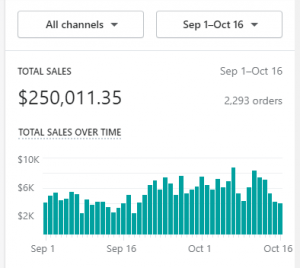
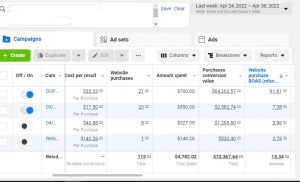
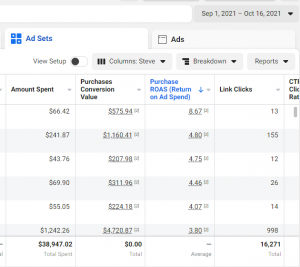

Schedule a free 15-Minute Facebook Ads Quick Fix Call with me, and let’s get your results on track!
Ready to get better results with your Facebook Ads?
On the call you will have the opportunity to ask me any questions about your ads and get my feedback about what’s working, what’s not, and what you can do to improve your results.
Click the button below to schedule your Quick Fix Call now!
I’m looking forward to helping you get great results with your Facebook Ads!

Schedule a free 15-Minute Facebook Ads Quick Fix Call with me, and let’s get your results on track!
Ready to get better results with your Facebook Ads?
On the call you will have the opportunity to ask me any questions about your ads and get my feedback about what’s working, what’s not, and what you can do to improve your results.
Click the button below to schedule your Quick Fix Call now!
I’m looking forward to helping you get great results with your Facebook Ads!
Analyzing data on the surface level instead of holistically
Getting link clicks for $0.05 is great. Having a CPM of $2 is amazing. And a CTR of 3% is incredible. But these numbers doesn’t always mean profitability and you shouldn’t always go for the cheapest clicks or the lowest CPMs.
A few data points that matter more than those are cost of purchase, lifetime value, and ROAS.
The way that this mistake looks in practice could be running an ad towards two different audiences on Facebook. The first audience is getting $0.50 link clicks and the second one is getting $1.50 link clicks. Just based off that data, most people would rather go for the $0.50 clicks. But what if it takes 300 of those $0.50 clicks to get a sale but it only takes 20 clicks from $1.50 audience? Now the second audience is clearly the better one when you look deeper into the data.
What matters most is data quality and traffic quality, not the cost of that traffic. Many people make this mistake with running traffic campaigns in Facebook with the logic of thinking if they spend $20 and get a thousand clicks, they’ll get a sale.
A quick solution to this is to simply analyze the other data that is attached to this element that point towards profitability. Click, add to cart, purchase, repeat buyer, etc.
You really need to make sure that you’re looking at the big picture when it comes to your Facebook ads and not just small data sets that can be misleading.
Taking super specific advice that isn’t relevant to your business
This one has many different levels and shades of grey to it, so before getting into it I must preface this with saying: I am not saying you should ignore all advice you are given with Facebook ads, but you should be careful about it.
What I see so many people do when making this mistake is they’ll ask a question asking for very specific help like “Should I do lookalike audiences for my business and which one?” or “How much should I spend on retargeting?” and the answers they get are like “Yes do 1% purchase lookalike” or “Spend exactly $30 a day on retargeting” without providing more information about the situation.
It’s like if you went up to a personal trainer that knows nothing about you and you asked them “How much should I eat in a day?” and they gave you a very specific answer without knowing more about your specific situation, then that would be a pretty good indicator that the advice they are giving you is not accurate.
This is why I tend not to give out specific answers to people without performing an audit or consultation in their ad account. So that when someone asks me “Which lookalike audience should I target?” I can look at their ad account, look at the data of their custom audiences, the performance of their retargeting campaigns, past campaigns where they’re run lookalike audiences, what type of ads they are running, etc. etc. and then give them an actual answer based on knowledge of their situation. Even after analyzing their account, I tend to have follow up questions as well to get even more context so that I can accurately answer the question.
If you are going to take advice from others, I recommend either having someone audit your account to understand your specific situation or I recommend asking questions to try and get multiple answers so that you can from there do your own testing and find out what the right answer is for you and your situation.
An additional mistake that I see happen with this way of thinking is that the person needing help will provide all of the information that they think is needed to get accurate advice but they don’t provide the right things. I saw someone posting recently saying that their store got like 1,000 visitors but no sales and they asked for help. I believe the information that they included was the store website, the amount that they spent on ads, and the amount of visitors. What was obvious to me was that they were paying way too little for traffic, so I assumed they were running a low-quality traffic campaign. After asking this, it was confirmed that was the case. Everyone else in the comments was just looking at the website like “Make your pictures better” or “Do a discount” but none of that advice would work until they fix their traffic quality problem. The person asking for advice had no idea that they should have included information about their campaign setting.
When people come to me struggling with their Facebook ad, it doesn’t matter what their situation is… the number of different things that could be causing the problem is virtually endless. They could have bad targeting, poor campaign structure, too many ads in an ad set, not giving ads enough time to optimize, ad copy typos, low-quality creatives, weak offer, improper budget allocation, and the list goes on and on.
To provide a real-life example that is relevant to me, I know very little about cars. If my car won’t start, it would take too much time for me to ask “My car won’t start, why not?” because I’m not an expert and I can’t provide enough context for someone to pinpoint the problem, they would have to ask me a bunch of follow up questions and I would probably not even know how to answer them or know what they are talking about. The best thing for me to do is to just go to a mechanic, give them the keys, and say “the car won’t start” and let them start analyzing the problem. And in this situation, it also doesn’t make sense for me to try and give them a ton of potential irrelevant information (within reason) that is just a waste of time like “Last week I got a car wash” or “I just got an oil change the other day” – what makes more sense is to allow them to ask ME the questions that allow them to get the information that they need for the situation.
If you went to a mechanic and said “my car won’t start” and they immediately try to sell you a new battery, that would be the same as if you say “my ads aren’t working” and someone immediately tells you to run ads on Instagram.
Providing a solution without proper diagnosing is malpractice in the medical field.
Taking super specific advice can work sometimes, but it can also backfire and make things worse.
The moral of the story is – be very careful about taking specific advice from people, even if they are considered to be experts. Make sure that the person giving you the advice is qualified to do so, and make sure that they understand your situation fully before doling out advice.
Running ads that are not aligned with the brand
With your brand, if you have a high-quality product or service then your ad creatives, videos, copy, everything in your marketing need to be high-quality as well.
This somewhat goes along with a previous point of how you don’t want to model someone’s strategy, you especially don’t want to do it if it is not aligned with your brand, which is just one instance that a strategy could work for one brand and not yours. If the branding is different of someone you are modeling then usually the strategy that will work is different as well.
When people make this mistake, usually the way it happens is they will create a brand that is high-quality, expensive, and a clean looking website. But then when they make a Facebook ad it has a ton of emojis and try-hard discount codes, a crappy video that they paid $10 for, and it is just super salesy.
The way that I go about solving this problem is a little deep and psychological. What you want to do is think about what type of emotions you want the people to feel when they interact with your brand. Do you want them to feel confident? Maybe laugh a little? Or to feel inspired? Whatever that emotion is, make sure that the feeling is felt all through the buying journey. From ad all the way to check out. You don’t want someone to laugh at your ad, cry when they get to your website, and then feel powerful when they become a customer.
A good exercise to do with this topic is to start being aware of other brand advertisements and figure out what type of emotions they are trying to evoke within you. I was watching TV recently and saw a commercial for My Pillow and it was the owner talking on camera and thanking their loyal customers. What I took from that was they were trying to build a personal connection with the viewer. An old job I had would run local TV commercials and every one of them had the president of the company on camera “Hi, I’m John the president of this company” and the emotion they were trying to give off was friendly and trustworthy in every single commercial they made because their branding was friendly.
Brand alignment is so important for ad strategies because the strategy part is useless if it does not align and work with the brand.
Now that you understand some of the most common mistakes people make when creating their Facebook ads make sure that you are mindful of each of these points when designing your next ad campaign, and be sure to consult with an expert if you need help. By avoiding these pitfalls, you’ll be on your way to crafting successful Facebook ads that lead to more sales and conversions for your business.

Schedule a free 15-Minute Facebook Ads Quick Fix Call with me, and let’s get your results on track!
Ready to get better results with your Facebook Ads?
On the call you will have the opportunity to ask me any questions about your ads and get my feedback about what’s working, what’s not, and what you can do to improve your results.
Click the button below to schedule your Quick Fix Call now!
I’m looking forward to helping you get great results with your Facebook Ads!

Schedule a free 15-Minute Facebook Ads Quick Fix Call with me, and let’s get your results on track!
Ready to get better results with your Facebook Ads?
On the call you will have the opportunity to ask me any questions about your ads and get my feedback about what’s working, what’s not, and what you can do to improve your results.
Click the button below to schedule your Quick Fix Call now!
I’m looking forward to helping you get great results with your Facebook Ads!

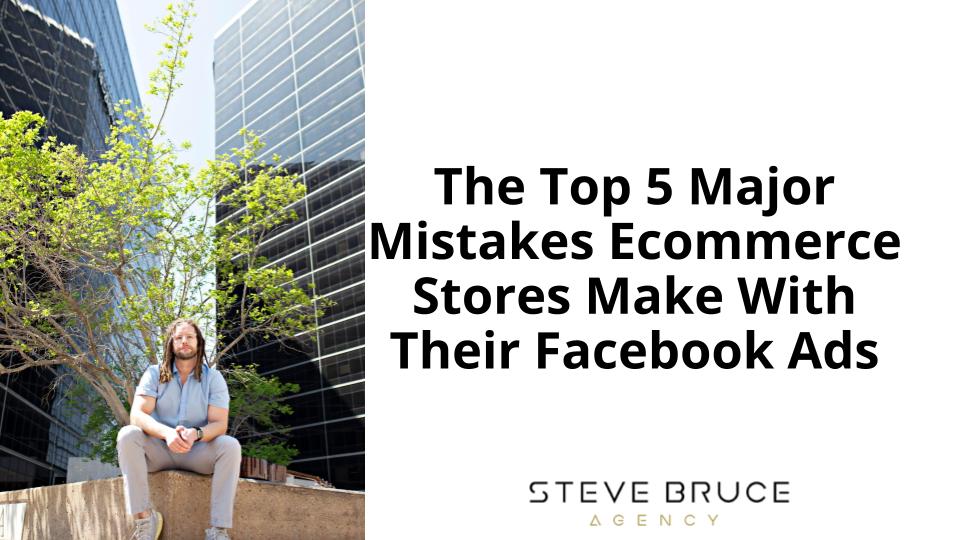
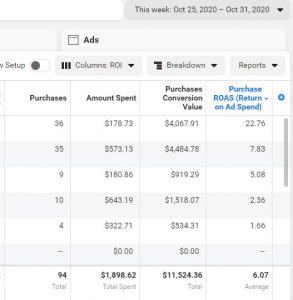
Recent Comments